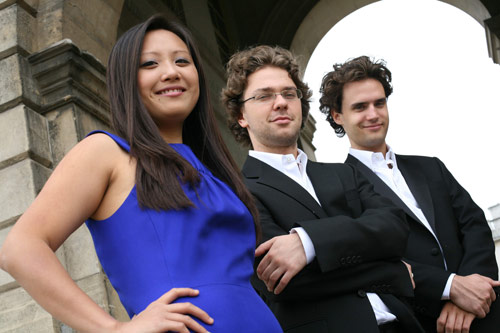
 |
|
The Sitkovetsky Trio, comprised of violinist Alexander Sikovetsky (center), pianist Wu Qian (left) and cellist Leonard Elschenbroich, will make their China debut at the Beijing Concert Hall. Provided to China Daily |
Three schoolmates from different countries met at the Yehudi Menuhin School in England in 1997 - with little inkling they would became the Sitkovetsky Trio in 2006.
They made their successful Southbank debut with a recital in the Purcell Room and were invited to play for the queen in London.
They will make their China debut during the UK Now arts festival, the largest ever festival of British arts and creative industries in China, where they will perform Haydn Trio Zigeuner, Brahms Trio No 2 and Dvorak Trio in F Minor.
"We knew one another very well (at school), though we never performed together," 27-year-old cellist Leonard Elschenbroich says.
The school only had 50 students, and the trio got together in 2006 for a one-off project. One thing led to another. They gradually built up their repertoire, started to perform more and got to know one another musically.
The group is comprised of violinist Alexander Sikovetsky from Moscow, pianist Wu Qian from Shanghai and cellist Leonard Elschenbroich from Frankfurt.
The trio took its name from the violinist's surname. There was a great violinist in the mid-20th century named Julian Sitkovetsky, and his son, Dmitry, is the violinist's uncle.
The three young musicians played chamber music from the very beginning of their musical lives and shared a passion for the genre.
They say chamber music is a major part of the Yehudi Menuhin School's curriculum, which required them to play in different formations.
"We already learned many things there, and this helped us very much when we started to play together," Elschenbroich says.
"We have always loved playing chamber music, as it has some of the most beautiful repertoires ever written. To get to play these incredible masterworks is very rewarding."
The group says the wonderful thing about chamber music is that its performance groups, such as trios, quartets and quintets, don't need a conductor. And there is perfect democracy in the interpretative process. Every member is equally entitled to express opinions, and decisions are reached through contemplations, arguments and votes.